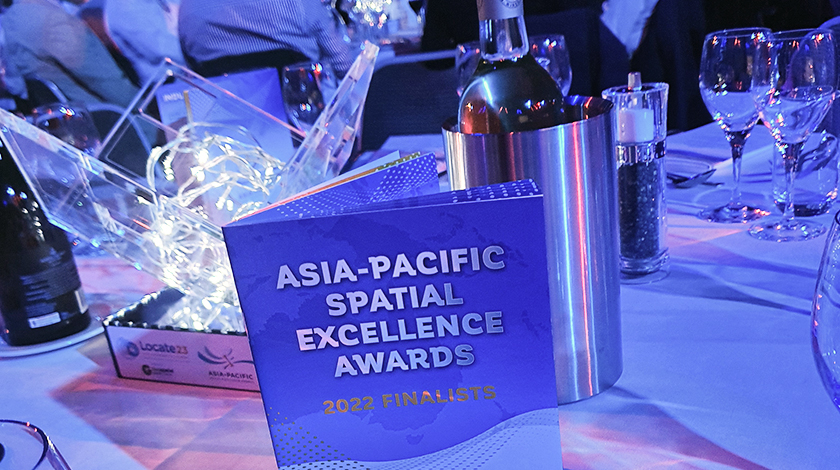Geospatial innovations around climate change, environmental impact solutions and earth observations for First Nations are among the winners of the 2022 Asia Pacific Spatial Excellence Awards (APSEA).
A strong theme this year was the focus on professional mentoring and workforce advancement through diversity and inclusion, with several individual winners recognised for many years of commitment to the space and spatial professions.
The premier awards program for space, spatial and surveying is conducted regionally across Australia and New Zealand, hosted by the Geospatial Council of Australia.
The Professional of the Year award was presented to Victoria’s Dr Zaffar Sadiq Mohamed-Ghouse, Director, Advisory & Innovation at Woolpert Asia-Pacific. A global leader in the geospatial industry, government advisor and mentor to many geospatial professionals, Zaffar works with the United Nations Global Geospatial Information Management, and serves on the boards of the World Geospatial Industry Council and Open Geospatial Consortium (OGC).
Two future leaders were recognised – Dr Jun Wang from Queensland and South Australia’s Andrew Bembrick.
Dr Jun Wang is a geodetic scientist, lead researcher and mentor at Land Solution Australia in Brisbane. He has published numerous academic papers, successfully obtained several research grants and played an active role on many iconic infrastructure and construction projects. Jun has mentored and supervised students and young professionals and established the Australian Chinese Geospatial Association group to promote the professional development and the exchange of ideas among professionals in the field of Surveying, GIS and Remote Sensing.
Andrew Bembrick graduated from RMIT University and joined Precision Hydrographic Services as a trainee hydrographic surveyor. He has become a senior hydrographic surveyor/project manager and mentor, managing large complex hydrographic surveys and leading a team of surveyors. He is now a career mentor at RMIT, and works to raise the profile of the hydrographic industry.
Full list of Oceania winners:
Professional of the Year Award – Dr Zaffar Sadiq Mohamed-Ghouse,
Future Leader of the Year Award – Joint winners: Dr Jun Wang, a geodetic scientist, lead researcher and mentor at Land Solution Australia, in Brisbane and South Australia’s Andrew Bembrick, a senior hydrographic surveyor/project manager and career mentor at RMIT.
The Diversity and Inclusion Award was presented to Yvonne Fong, from Western Australia. While working at NGIS Australia as an Earth Observation (EO) Data Scientist, Yvonne advocated for EO solutions for traditional owners through the First Nations Earth Observations project, built capacity for Digital Earth Africa, led as a project manager, and is now a Spatial Ecologist at Spectrum Ecology & Spatial.
The Educational Development Award was presented to Dr Jagannath Aryal from Victoria. Dr Aryal is an academic at the University of Melbourne who has worked in Government and Academic sectors in close collaboration with private industry. He has delivered Surveying and Remote Sensing education to students in Asia, Europe and Oceania.
The Undergraduate Student of the Year is Tong Ding, from Curtin University, for his thesis on GNSS radio occultations emerging as new technology for upper-air monitoring, which is crucial for tackling climate change and understanding changing weather patterns.
The Postgraduate Student Award was presented to PhD student Kexiang (Frank) Hu from Curtin University whose strong background in hydroclimate and hydrogeology offered new insights into understanding Australian groundwater.
Award for Community Impact: Beca Limited, Waipā District Council, InPlace Limited, Maximize Limited, Interactionz for the Waipa Community Spatial Plan which creates a blueprint for the district and the foundation for future planning and investment. (New Zealand)
Award for Environment & Sustainability: FrontierSI, SmartSatCRC, Myriota, University of South Australia, NGIS, SA Government (Dept for Environment and Water) for the SIG Water project which deployed 70 groundwater bores with direct-to-space IoT communication and increased understanding of groundwater as a resource. (South Australia)
Award for Innovation – Small Business: Kurloo Technology Pty Ltd, for the Port of Brisbane Seawall project, faced with the challenge of protecting an environmentally sensitive marine park. (Queensland)
Award for Innovation – Medium to Large Business: FrontierSI, University of NSW, Omnilink, Commonwealth Bank, NSW Government, Liverpool Council, Slate Analytics for the Value Australia interactive platform, which uses AI and machine learning for scenario planning and value uplift projects. (New South Wales)
The JK Barrie Award and the Award for International Partnership: FrontierSI, Ericsson, Optus, GMV, Platfarm, Position Partners, Kondinin, Acil Allen for the 5G Precise Positioning Testbed. The testbed used a global partnership to leverage the Optus 5G network and demonstrate the economic benefit of 5G precise positioning. (Victoria)
Award for Spatial Enablement: WildBear Entertainment & Esri Australia for mastering the art of storytelling with maps. WildBear develops optically stimulating, highly accurate maps for broadcast. (Australian Capital Territory)
Award for Technical Excellence: Department of Environment, Land, Water and Planning (DELWP), DSM Soft, Spatial Vision and Jacobs for the Digital Cadastre Modernisation Project. The modernisation project will transform Victoria’s cadastral parcel and property boundaries into a data-driven, spatially accurate, 2D digital representation. (Victoria)
Award for Workforce Development and Inclusion: Veris and Wumara Group Alliance for the Indigenous Surveyor Employment Pathway Program which offers indigenous Australians a pathway into the surveying industry. (New South Wales)
Click here to find out more about our winners and regional finalists


0 Comments